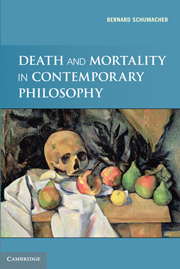Book contents
- Frontmatter
- Contents
- Preface
- Introduction
- Part One Human Personal Death
- Part Two Theory of Knowledge About Death
- Part Three Does Death Mean Nothing To Us?
- 8 The “Nothingness of Death”
- 9 Discussion of Experientialism and the Need for a Subject
- 10 Death
- Conclusion
- Bibliography
- Index of Names
- Index of Concepts
8 - The “Nothingness of Death”
Epicurus and His Followers
Published online by Cambridge University Press: 05 June 2012
- Frontmatter
- Contents
- Preface
- Introduction
- Part One Human Personal Death
- Part Two Theory of Knowledge About Death
- Part Three Does Death Mean Nothing To Us?
- 8 The “Nothingness of Death”
- 9 Discussion of Experientialism and the Need for a Subject
- 10 Death
- Conclusion
- Bibliography
- Index of Names
- Index of Concepts
Summary
Presuppositions of the Epicurean thesis of the “nothingness of death”: materialism, hedonism, and experientialism
In order to mitigate the fear of death, or even nip it in the bud, Epicurus demonstrates that it must not matter to the individual: it “is nothing to us”, because the subject does not find himself in the state of death during his existence, nor in existence once he is deceased. “Death […] is nothing to us, since so long as we exist, death is not with us; but when death comes, then we do not exist”. This thesis of the “nothingness of death” corresponds to two features of Epicurean thought: on the one hand, a hedonistic ethos of pleasure and happiness, which is itself based on his theory of sense knowledge (or “experientialism”), and, on the other hand, an atomistic and materialistic view of the world. The latter prompts the philosopher of the Garden to say that death signifies the nonexistence of the subject, despite the temporary presence of the corpse. The separation of the soul from the body at decease does not mean, for Epicurus, that the soul continues to exist in itself, as Plato and (according to some interpretations) Aristotle maintain. Being corporeal, since it is composed of atoms, and hence mortal, the soul dissolves at the moment of the subject’s death. Its atoms are dispersed in all directions. Thus it is impossible for the ‘dead’ soul to be the subject of sensations: “death is deprivation of sensation”. Human death means the irreversible end of the individual and of all experience.
Epicurus disagrees with Plato and Aristotle not only on the question of death and afterlife, but also on the question of happiness. More specifically, Epicurus differs from them in that he does not connect the idea of good with the notion of the perfection of human nature. Distancing himself from a theory of happiness based on the virtues, he proposes the thesis that happiness is found in pleasure, which is “the beginning and end of the blessed life”. Cicero records in his treatise De finibus that the philosopher of the Garden based his ethics on the statement that “every animal, as soon as it is born, seeks for pleasure, and delights in it as the Chief Good, while it recoils from pain as the Chief Evil, and so far as possible avoids it”. Determining whether a state of affairs or an event is good or evil depends, for Epicurus, on the sensation that the subject may have of it. Underlying Epicurean hedonism we find the experientialism that plays a major role in the argument about the “nothingness of death”. In order for a state of affairs or an event to be described as good or evil, the subject must be capable of experiencing it, which presupposes temporal and spatial parameters. Epicurus maintains that a person can be happy or unhappy only insofar as he has experiences (in which he is subject to pleasures or pains). One classifies a state of affairs as good or evil according to the experience that it occasions. An event that could not be experienced would be indifferent.
- Type
- Chapter
- Information
- Death and Mortality in Contemporary Philosophy , pp. 151 - 167Publisher: Cambridge University PressPrint publication year: 2010



